2018 Year in Review
We had a bright and productive 2018 here at Stanford PACS in our mission to improve philanthropy and strengthen civil society through knowledge and research—to effect widespread, lasting social change.
Publications
Faculty Co-Directors Paul Brest and Rob Reich led the way with new books advancing the field and dialogue on philanthropy.
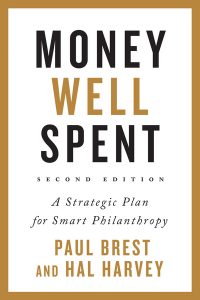
Money Well Spent (2018)
In Money Well Spent: A Strategic Plan for Smart Philanthropy, second edition, Brest alongside co-author Hal Harvey presents recommendations and tools on how to structure philanthropy so it is most effective and really makes a difference. This comprehensive and crucial resource for individual donors, foundations, nonprofits, and scholars accounts for a decade of progress: a rise in impact investing, the advent of pay-for-success programs, the maturation of impact evaluation, and the emergence of a new generation of mega-donors. Today, the notion of results-driven philanthropy is more important than ever. With this book, the social sector has the techniques it needs to deliver on that idea with impact.
In his incisive new work, Just Giving: Why Philanthropy Is Failing Democracy and How It Can Do Better, Reich shows how generosity not only isn’t the unassailable good we think it to be, but it might also undermine democratic values and set back aspirations of justice. He argues that philanthropy is often an exercise of power and wealth leveraging the conversion of private assets into public influence. And small philanthropy, or ordinary charitable giving, can be problematic as well. Charity, it turns out, does surprisingly little to provide for those in need and sometimes worsens inequality.
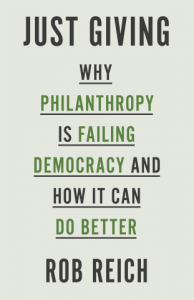
Just Giving: Why Philanthropy Is Failing Democracy and How It Can Do Better
These outcomes are shaped by the policies that define and structure philanthropy. When, how much, and to whom people give is influenced by laws governing everything from the creation of foundations and nonprofits to generous tax exemptions for donations of money and property.
Please view the PACS book launch event videos here:
Civic Life of Cities
GLOBAL SURVEY LAUNCH
SEATTLE | VIENNA | SHENZHEN | SYDNEY

Above is the Facebook campus in Menlo Park, rising in stark contrast to a homeless encampment in field towards the center of the image. This is a striking example of the economic inequality that exists, and that civil society organizations address, across cities worldwide.
After studying the nonprofit sector in the San Francisco Bay Area for nearly two decades, Professor Woody Powell and a global team of researchers from six universities have embarked on a new round of the study that will provide a cross city comparison of nonprofit sectors across five cities globally—adding Seattle, Shenzhen, Sydney, and Vienna to the SF Bay Area community. The interdisciplinary group, dubbed the Civic Life of Cities Lab, developed a survey and research approach for global city cross-comparisons, which will compare the experiences that civil society organizations face in today’s current economic, political and social climate, and reveal insights on practices that could be shared globally.
The survey was launched in Shenzhen, China in Fall 2018. Shenzhen is China’s first special economic zone and, similar to the SF Bay Area, is known as a cultural capital marked by the massive growth of the tech industry. For over two months, PACS postdoctoral fellows Wei Luo and Wenjuan Zheng resided in Shenzhen, conducting interviews with a colorful assortment of local nonprofit leaders of more than 100 organizations, ranging from the local chamber of commerce to child care centers.
The SF Bay Area survey was launched in January 2019, driven by Sociology graduate students Christof Brandtner, Aaron Horvath, and Nick Sherefkin. Aaron and Christof also implemented the last round of the Bay Area survey 5 years ago. They are supporting the evolution of the work to go beyond how individual nonprofit organizations operate and behave to explore the influence civil society organizations have in their local communities. The Bay Area team will collect local perspectives both through its online survey as well as in-depth interviews with nonprofit leaders that represent a diversity of experiences in the area.
In the following months, the Civic Life of Cities team will launch surveys in Sydney, Seattle, and Vienna. Several additional cities in Asia and South America will follow in the coming years.
Effective Philanthropy Learning Initiative
 HOW DATA INFLUENCES PHILANTHROPY
HOW DATA INFLUENCES PHILANTHROPY
In 2018, the Effective Philanthropy Learning Initiative (EPLI) published the results of the Data For Donor Impact project. The study looks at how individual donors gather information before making a donation, with special attention paid to how they use online data presented by intermediaries. The two-part report focused first on High Net Worth donors and second on “everyday” donors. The EPLI team further analyzed donors’ opinions and giving behaviors in response to differences in how nonprofits self-report their work in an experiment titled Charting Impact.
Also in 2018, the EPLI team created a new database of nonprofit grantees of the 50 largest private foundations across the United States called Follow The Leader (FTL). The tool summarizes the grantmaking activity of top foundations to provide individual donors with the same “due diligence” on potential organizations that foundations use to make sure their investments will have the desired impact. Individual donors can “borrow” this due diligence and Follow The Leader, or they can use the information provided to better understand the larger context of grantmaking in the subject areas they care about.
Global Innovation for Impact Lab
DEEPENING RESEARCH AND PARTNERSHIPS
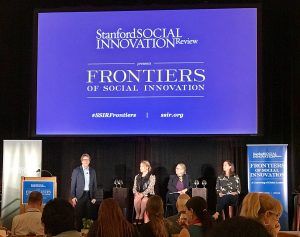
Global Innovation for Impact Lab (GIIL)’s Christian Seelos takes the stage at the Stanford Social Innovation Review’s 2018 Frontiers of Social Innovation.
In its efforts to leverage insights on effective innovation and scaling for system change, the Global Innovation for Impact Lab (GIIL) led convenings, facilitated trainings, workshops, and courses, and continued to deepen its research and partnerships in 2018.
In partnership with the Harvard Social Innovation and Change Initiative, GIIL hosted the Rethinking Cross-Sector Social Innovation conference to reignite scholarly interest in cross-sector work and build knowledge that informs decision-making and policy. GIIL presented its research on system change at a special breakfast panel session at the Skoll World Forum, and led a panel, “The Promise of Systems Change,” with leading systems thinkers at Stanford’s Frontiers of Social Innovation.
In the educational sphere, GIIL formed the core faculty for the leadership course for Schwab Social Entrepreneurs at Harvard Kennedy School, brought its executive training expertise to the inaugural Managing Innovation for Impact training program for senior international development professionals at the Rockefeller Foundation Bellagio Center, shared its insights on social innovation with global executives at the Hertie School of Governance, and delivered the final keynote for graduates of the NGO Academy Vienna.
Taking systems change as a complex innovation process under conditions of high degrees of uncertainty, GIIL is working to expand its frameworks and diagnostic tools on effective innovation and scaling to develop new insights collaboratively with organizations and other initiatives. “Mastering System Change,” by GIIL’s Christian Seelos and Johanna Mair, is a first set of perspectives published in PACS’ own Stanford Social Innovation Review. GIIL also established a learning partnership with Co-Impact to further unearth important findings on systems change in the coming years.
Stanford Social Innovation Review
KOREA EDITION LAUNCH
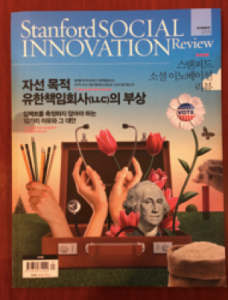 SSIR is dedicated to advancing the field of social innovation globally, and we recognize that new solutions to social challenges are emerging around the world.. In 2017, SSIR launched its first fully-translated local-language edition (LLE) in China. The Chinese LLE has now published four issues, and continues to publish a quarterly print publication. Joining the Chinese, SSIR is proud to announce the launch of its Korean-language edition in 2018.
SSIR is dedicated to advancing the field of social innovation globally, and we recognize that new solutions to social challenges are emerging around the world.. In 2017, SSIR launched its first fully-translated local-language edition (LLE) in China. The Chinese LLE has now published four issues, and continues to publish a quarterly print publication. Joining the Chinese, SSIR is proud to announce the launch of its Korean-language edition in 2018.
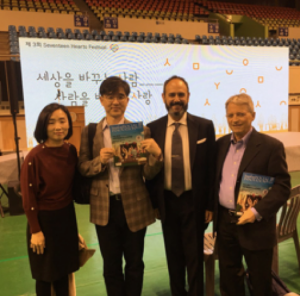
As part of the ceremony, Hanyang’s President Dr. Lee Young-moo recognized SSIR managing editor Eric Nee and publisher Michael Voss.
SSIR has partnered with the Social Innovation Lab at Hanyang University—one of the leading private universities in South Korea—to produce a quarterly print edition of the magazine and an eventual digital destination. The quarterly magazine will translate content from the English-language US version of SSIR, and will eventually publish original content on social innovation in South Korea and Asia.
To celebrate the launch of SSIR Korea, a ceremony was held at Hanyang’s campus in Seoul as part of the official opening of their third annual “17 Hearts Festival,” a three-day festival that recognizes various national and international student organizations dedicated to global change-making, public responsibility, and value-creation for society.SSIR has plans to launch pan-regional local-language editions in Spanish and Arabic in the next 12-18 months, with the long-term goal of creating a global network of social innovation thought-leadership content.
